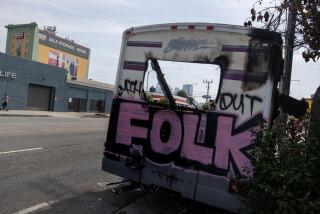Panel Rejects Tax to Move Abandoned Cars : Fees: Transportation Commission kills plan to charge all of the county’s vehicle owners $1 a year for the service.
The Ventura County Transportation Commission on Friday unanimously rejected a plan to tax all of the county’s car owners $1 a year to cover the cost of removing abandoned vehicles.
The vote came after elected leaders and taxpayer advocates denounced the fee as unnecessary and unwise in a county that is still ailing economically.
“I think this is the wrong time to be adding more taxes,” said county Supervisor John K. Flynn, a commission alternate.
Under a plan drafted by the commission’s staff, vehicle owners would have paid an extra dollar annually in registration fees.
The money would have been used to reimburse the county and its 10 cities for the costs of tagging and arranging the removal of cars and trucks abandoned on public streets and private property.
The idea needed the approval of a majority of the cities representing more than half of the county’s population. It also required the support of at least four of the five county supervisors.
The Transportation Commission staff recently sent an outline of the fee plan to the cities so the required votes could take place before an Oct. 1 state deadline.
But the tax appeared headed for defeat earlier this week when the city councils of Thousand Oaks, Moorpark and Santa Paula rejected it.
In addition, Flynn and Supervisor Vicky Howard expressed their opposition Friday, virtually assuring it would not clear that board.
Originally, the transportation commission staff recommended that the commission--a nine-member panel of elected officials and appointees--urge the county and the cities to approve the abandoned-vehicle fee.
But at Friday’s meeting, Ginger Gherardi, the commission’s executive director, changed her recommendation. She urged the panel to remain neutral and allow the cities and the county to decide the fate of the $1 tax.
She also announced that even the cities that had already rejected the fee could obtain their share of the revenue later, if county supervisors and enough other cities approved the tax.
Despite the new recommendation from Gherardi, Simi Valley Councilman Bill Davis, a commission member, moved that the transportation panel reject the fee outright, calling it “absolutely unneccesary.”
“It’s obvious that the cities are able to handle this program” without the fee, Davis said.
According to figures compiled by the commission staff, Ventura County and its cities responded to 15,848 abandoned-vehicle complaints last year at a cost of $363,979. Some vehicles were towed, but others were moved by their owners after a warning notice was issued.
Private towing companies usually haul away abandoned vehicles at no cost to the local government. But the city or county must pay for police or code-enforcement officers to respond to calls, tag the vehicles and process the appropriate papers.
The commission staff said the $1 fee would have raised about $487,000 a year, which would have been used to repay the cities and the county for these costs.
Ventura and Oxnard were the cities with the largest number of abandoned vehicles in 1992, and police and staff members in these cities said prior to the meeting that they strongly favored the fee plan.
But the city councils in Ventura and Oxnard had not yet voted on the proposal, and no representatives of these cities spoke for or against the fee at Friday’s commission meeting.
Leaders of two government watchdog groups did register their opposition.
Jere Robings, executive director of the Ventura County Alliance of Taxpayers, said he had trouble believing the cost of processing abandoned car complaints was as high as the figure compiled by the commission staff.
Mike Saliba, executive director of the Ventura County Taxpayers Assn., told the commission: “This is an extra fee for services the taxpayers are already receiving. It really is time for government at all levels to hold the line on new taxes and fees.”
In an interview after the vote, Saliba said he was pleased.
“It basically shows that the transportation commission is listening to the voice of the taxpayers,” he said. “I was very encouraged that they agreed to reject the program outright, without the necessity of referring it out to the cities.”
More to Read
Sign up for Essential California
The most important California stories and recommendations in your inbox every morning.
You may occasionally receive promotional content from the Los Angeles Times.










